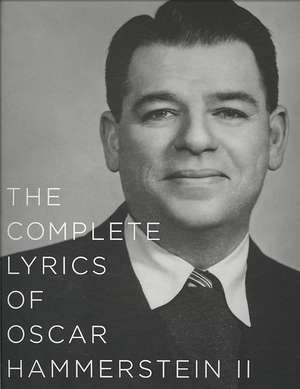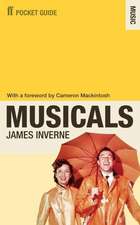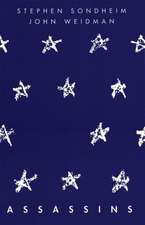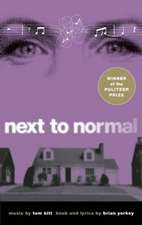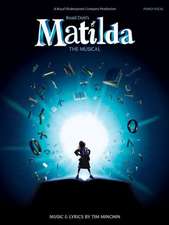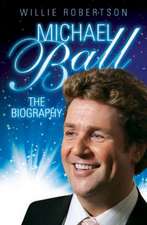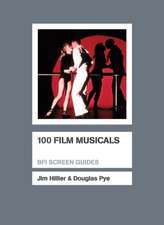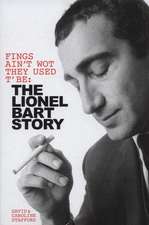The Complete Lyrics of Oscar Hammerstein II
Autor II Hammerstein, Oscar Editat de Amy Aschen Limba Engleză Hardback – 31 oct 2008
Born into a theatrical dynasty headed by his grandfather and namesake, Oscar Hammerstein II breathed new life into the moribund art form of operetta by writing lyrics and libretti for such classics as Rose-Marie (music by Rudolf Friml), The Desert Song (Sigmund Romberg), The New Moon (Romberg) and Song of the Flame (George Gershwin). Hammerstein and Jerome Kern wrote eight musicals together, including Sweet Adeline, Music in the Air, and their masterpiece, Show Boat. The vibrant Carmen Jones was Hammerstein’s all-black adaptation of the tragic opera by Georges Bizet.
In 1943, Hammerstein, pioneer in the field of operetta, joined forces with Richard Rodgers, who had for the previous twenty-five years taken great strides in the field of musical comedy with his longtime writing partner, Lorenz Hart. The first Rodgers and Hammerstein work, Oklahoma!, merged the two styles into a completely new genre—the musical play—and simultaneously launched the most successful partnership in American musical theater. Over the next seventeen years, Rodgers and Hammerstein wrote eight more Broadway musicals: Carousel, Allegro, South Pacific, The King and I, Me and Juliet, Pipe Dream, Flower Drum Song, and The Sound of Music. They also wrote a movie musical (State Fair) and one for television (Cinderella). Collectively their works have earned dozens of awards, including Pulitzers, Tonys, Oscars, Grammys, and Emmys.
Throughout his career, Hammerstein created works of lyrical beauty and universal feeling, and he continually strove—sometimes against fashion—to seek out the good and beautiful in the world. “I know the world is filled with troubles and many injustices,” he once said. “But reality is as beautiful as it is ugly . . . I just couldn’t write anything without hope in it.”
All of his lyrics are here—850, more than a quarter published for the first time—in this sixth book in the indispensable Complete Lyrics series that has also brought us the lyrics of Cole Porter, Lorenz Hart, Ira Gershwin, Irving Berlin, and Frank Loesser. From the young scribe’s earliest attempts to the old master’s final lyric—“Edelweiss”—we can see, read, and, yes, sing the words of a theatrical and lyrical genius.
Preț: 360.58 lei
Preț vechi: 391.93 lei
-8% Nou
Puncte Express: 541
Preț estimativ în valută:
68.100€ • 72.23$ • 57.09£
68.100€ • 72.23$ • 57.09£
Carte disponibilă
Livrare economică 15-29 martie
Livrare express 01-07 martie pentru 110.15 lei
Preluare comenzi: 021 569.72.76
Specificații
ISBN-13: 9780375413582
ISBN-10: 0375413588
Pagini: 422
Ilustrații: 82 PHOTOGRAPHS IN TEXT
Dimensiuni: 272 x 295 x 36 mm
Greutate: 2.36 kg
Editura: ALFRED A KNOPF
ISBN-10: 0375413588
Pagini: 422
Ilustrații: 82 PHOTOGRAPHS IN TEXT
Dimensiuni: 272 x 295 x 36 mm
Greutate: 2.36 kg
Editura: ALFRED A KNOPF
Notă biografică
Amy Asch, an archivist and researcher, worked on The Complete Lyrics of Irving Berlin and an expanded edition of The Complete Lyrics of Lorenz Hart. She contributed to the PBS documentary Broadway: The American Musical and prepared the catalog of works for the estate of the composer Jonathan Larson (Rent). Currently an editor of the Playbill Broadway Yearbook, she lives in New York City.
Extras
Songs of 1916–1925
Shakespeare Up-to-Date
Oscar Hammerstein II’s first known lyric was a tercentenary tribute to the Bard (d. 1616) interpolated into The Peace Pirates, the Columbia University Varsity Show of 1916.
Music probably by Ray Perkins. Published in a limited edition piano-vocal score. Introduced by principals and chorus.
VERSE 1
In my youthful college days
I read all of Shakespeare’s plays
From Henry VIII to Taming of the Shrew.
I’ve seen almost ev’ry one
Of the plays that Shaw has done,
And can’t find much resemblance in the two.
But strange to say I had an awful dream the other night.
I woke to see this weird unusual sight:
REFRAIN 1
Oh there was Romeo and Imogen parading around the room.
Lady Macbeth was getting married with Hamlet as the groom.
Then Juliet and Lear were playing cards
While Portia was keeping score.
Now this may all seem wrong to you
But I’m sure it would be true
If George Bernard Shaw had but written
Some of Bill Shakespeare’s plays.
VERSE 2
Once a friend remarked to me,
How great would the profit be
To put some music to Bill Shakespeare’s shows.
I have hunted all around,
There’s a man that I have found
Could do the job as ev’rybody knows.
Just fancy George M. Cohan in a music comedy
For this is how his stunt would doubtless be:
REFRAIN 2
Henry VIII would wave a flag and sing “Hooray for the U.S.A.”
Shylock would seek his pound of flesh in a patriotic way.
Then Cleopatra might be seen in tights
Or dancing with Romeo.
Now this may all seem wrong to you
But I’m sure it would be true
If George Cohan had ever produced
Some of Bill Shakespeare’s plays.
Home, James (1917)
New York run: Hotel Astor, Grand Ballroom; opened March 28, 1917; 5 performances. A musical comedy in two acts, presented by the Columbia University Players under the management of Charles Steiner, class of ’17. Book and lyrics by Herman A. Axelrod, ’15, and Oscar Hammerstein II, ’18L. Music by Robert K. Lippmann, ’19. Additional music and lyrics by Kenneth S. Webb, ’06; Roy Webb, ’10; M. S. Wolff, ’15; Robert A. Simon, ’18; Frank Padwe, ’16; Edgar Wolfe, ’20; Cyril S. Laub, ’18; and G. M. Watts, ’17. Staged under the direction of Kenneth S. Webb. Orchestra under the direction of Roy Webb, ’10. Orchestrations by Roy Webb.
Major roles: John D. Beals Jr., ’17 (Gideon Guiness); Randolph M. Saville, ’18 (Steve Guiness, his son); James D. Herbert, ’19 (the Red Rose Girl); Phillip B. Leavitt, ’18 (Marion Gay, Steve’s sweetheart); Ormond V. Gould, ’17 (Lucius Vodka, a mysterious personage); Oscar Hammerstein II, ’18L (Armand Dubonnet, head waiter at Roget’s); H. William Hanemann, ’17 (Emma Guiness, Gideon’s better 99/100); Louis C. Owens Jr., ’20 (Vivienne, her daughter).
Except as detailed below, the lyrics were preserved in a lavish program-libretto and in a smaller pamphlet of lyrics. The program advertises a vocal score, but none of the music is known to survive. A song list published in the Columbia Daily Spectator, March 9, 1917, includes the title “What’s This Old World Coming To?” by Axelrod, Hammerstein and Lippmann, to be performed in act two by the character Lucius Vodka; that song has not been found.
Hammerstein played the leading comic role in the show, and after one of the matinees he received congratulations from fraternity brother Mortimer Rodgers and Rodgers’ musical younger brother, Richard.
ACT ONE OPENING CHORUS
Lyric by Oscar Hammerstein II and Herman Axelrod. Introduced by the ensemble.
Ensemble:
People think we’re bank directors
Just because we dine at Rector’s.
But from eight o’clock till five,
We just have to keep alive
Behind a ribbon counter.
Every day when work is over,
We start out each one a rover,
Dancing till the break of day,
Trying hard to look blasé In a careful, careless way.
Girls:
We are ladies of the chorus.
Tired businessmen adore us.
We hate auto rides and pearls,
For we’re just hard-working girls.
We are martyrs to the cause of art.
Comedy Group:
Our little group of serious thinkers
Always investigates and tinkers,
In our inimitable way
With the problems of the day.
Cubist art and verse that’s free,
Surely are the things we Find most interesting,
Oh, yes, we do.
We’re the ones who set the craze
Dining in red-ink cafes
Until the lights go out.
All:
Stick around, this is going to be some show.
We’ve seen all the rehearsals and we know.
Scenery quite disturbin’
Done by our own Urban.
The cast and the chorus are chock full of pep and go.
Every song has a tuneful melody,
Sparkling with originality.
As for the whole libretto and the lyricizing,
There’s no use to start a- criticizing,
If you don’t believe it, wait and see!
Marion
Lyric by Oscar Hammerstein II and Herman Axelrod. Introduced by Randolph M. Saville (Steve) and chorus.
VERSE 1
Girlies by hundreds I’ve oft met before
And they’ve made no impression on me.
Those who were pretty had nobody home
And the bright ones were plain as could be.
Some girls were shy But I passed them all by,
And I shunned all the wise dames too,
’Cause each little peach had her own little flaw;
But I’m glad I persisted
For I found there existed
The one and the only she!
REFRAIN
Marion, oh, won’t you marry me?
You’re the only girl I’ve found.
Marion, now please don’t carry on,
For I’m hopelessly smitten
And weak as a kitten,
Whenever you’re around.
All the rest are merely also-rans;
There’s but one that I can see.
Won’t you please stop your tarryin’,
Dear little Marion,
And think of marryin’ me?
VERSE 2
Where is the play of today that’s completed
Without some love interest to blend?
Don’t be so slow, dear,
You may as well know, dear,
You’ll be in my arms at the end.
First you may dally,
But at the finale
I’ll call you my blushing bride.
’Cause if you were not,
It would spoil all the plot.
And a good leading lady Is never old-maidy,
So let’s get the license now.
REPEAT REFRAIN
Plankety Plank
Lyric by Oscar Hammerstein II and Herman Axelrod. Introduced by Randolph M. Saville (Steve), Phillip B. Leavitt* (Marion), and the Mandolin Club.
VERSE 1
A wee mandolin and a big guitar
Were thrown together by chance.
’Twas way downtown in a music store
They started their own romance.
The great big guitar told the mandolin
There was never an instrument cuter.
When he stole a kiss, she
Coyly told him that he
Was a suitor
Too ardent to suit her.
REFRAIN
“Plunkety-plunkety plunk, plunk?”
That’s how he worded his plea.
“Planky-planky plankety, planky plank,”
She’d answer, “Not for me.”
“See how you’re pulling my heart strings?”
“Plankety, planky, plank.”
Then at last his persistence
Broke down her resistance,
And so
’Tis said
They went
And wed,
And now they are both in tune.
VERSE 2
The wee mandolin and the big guitar
Have learned how to harmonize.
He accompanies her every place she goes;
He knows he has won a prize.
He thrills as she trills in her rhythmic way
For indeed they are never quite quiet.
They have no cause to brood O’er the high cost of food,
With their music and love for a diet.
REPEAT REFRAIN
* Phil Leavitt, who played the “heroine” of Home, James, is best remembered for his role in introducing Richard Rodgers to Lorenz Hart. He also performed “There’s Always Room for One More,” the first song with words by Hammerstein and music by Rodgers.
Poor Armand
Lyric by Oscar Hammerstein II and Herman Axelrod. Introduced by Oscar Hammerstein II (Armand). The New York Herald called Hammerstein “funmaker in extraordinary as Armand Dubonnet, maître d’hôtel, who breaks into society as a supposed comte.”
I
I was very young at the time,
The spring was in the air,
That is the season when a young man’s fancy
Turns to thoughts that cause a lot of trouble.
She was a wispy, fairy-like thing,
Clad in her gossamer gingham.
Out into the country, we’d take long walks.
Oh—the bull! How I’d fling him.
But one fateful day, I proposed to her.
She coldly looked at me and said:
“Grande passion is out of fashion, my dear Armand.
It could never turn my head,
You are nice boy and I like you,
You are chivalrous—and all that sort of rot.
But we could never tie the lover’s knot,
For we are lovers—not!”
II
Then I met another girl,
A ravishing vision of beauty!
She had that golden hair and deep blue eyes
That told of a nature
That was proud—though Swedish.
She was a cook in a beanery lunch,
And I was only a waiter.
But oh—the French pancakes that she could make!
How I loved her cooking!
But one day I looked through the kitchen door,
Behol’ the sight that met my eye,
Sitting in my chair was a great big fat policeman.
Oh—I almost want to cry,
I break in the door
I say—“What does this mean?”
She—“Armand, no more French pancake for you.”
This cop—he was Irish too,
And for him she make the Irish stew!
III
There was charming, chic ’Toinette,
She was my fourth or fifth affaire.
I thought she’d care,
But she became a barber’s bride.
There was Julie—roguish Jou-Jou,
Sweet Marie and piquant Lulu,
Fluffy frou-frou swiftly flitting from my side.
I was always a girl’s first love,
Never anybody’s last.
Each said I was the first that ever kissed her,
But it mattered not what I did,
She decided very fast
That to me she would be
Just a sister.
Here’s a letter from the last one:
“Dearest Armand,
I can’t forget last night, just when you left me.”
Oh, it was very nice.
“And how is my little papoose?”—
She always calls me that—
“And, Armand, dear, do you think
That my husband—?”!!!
Home, James
Lyric by Oscar Hammerstein II and Herman Axelrod. Introduced by Randolph M. Saville (Steve), Phillip B. Leavitt (Marion), Ormond V. Gould (Vodka), and chorus.
VERSE 1
I want to be a star in moving pictures,
Like Mary, Charlie, Douglas, and the other fixtures.*
I will sell my autograph
Written on my photograph.
My personality
Will make a hit for me,
And I’ll be the talk of the town.
REFRAIN
You’ll see me twinkle, twinkle, twinkle as a movie star
In glaring lights, from dizzy heights.
When once or twice you’ve seen
Me shine upon the screen,
I’ll be riding round the city in my limousine.
And then I’ll never, never, never go to bed until
The clock strikes one, two, three or four o’clock.
Then—“Home, James, drive me fast!”
That’s the existence for me.
Verse 2
I loved the dirty villain in the drama.
Poor dear Mathilda, he near killed her with a hammer.
He used to hiss, “Where is the child?”
But now his manner’s meek and mild.
No more he’ll villainize.
His aim with custard pies
Has made him Keystone Komedy King.
REPEAT REFRAIN
* In the introduction to his anthology, Lyrics, Hammerstein gave the opening lines as “I want to be a star in moving pictures/Like Chaplin, Pickford, Fairbanks, and the other fixtures” and commented: “Quite a rhyme! Like my two collaborators, I expected to make my living in another calling.”
Shakespeare Up-to-Date
Oscar Hammerstein II’s first known lyric was a tercentenary tribute to the Bard (d. 1616) interpolated into The Peace Pirates, the Columbia University Varsity Show of 1916.
Music probably by Ray Perkins. Published in a limited edition piano-vocal score. Introduced by principals and chorus.
VERSE 1
In my youthful college days
I read all of Shakespeare’s plays
From Henry VIII to Taming of the Shrew.
I’ve seen almost ev’ry one
Of the plays that Shaw has done,
And can’t find much resemblance in the two.
But strange to say I had an awful dream the other night.
I woke to see this weird unusual sight:
REFRAIN 1
Oh there was Romeo and Imogen parading around the room.
Lady Macbeth was getting married with Hamlet as the groom.
Then Juliet and Lear were playing cards
While Portia was keeping score.
Now this may all seem wrong to you
But I’m sure it would be true
If George Bernard Shaw had but written
Some of Bill Shakespeare’s plays.
VERSE 2
Once a friend remarked to me,
How great would the profit be
To put some music to Bill Shakespeare’s shows.
I have hunted all around,
There’s a man that I have found
Could do the job as ev’rybody knows.
Just fancy George M. Cohan in a music comedy
For this is how his stunt would doubtless be:
REFRAIN 2
Henry VIII would wave a flag and sing “Hooray for the U.S.A.”
Shylock would seek his pound of flesh in a patriotic way.
Then Cleopatra might be seen in tights
Or dancing with Romeo.
Now this may all seem wrong to you
But I’m sure it would be true
If George Cohan had ever produced
Some of Bill Shakespeare’s plays.
Home, James (1917)
New York run: Hotel Astor, Grand Ballroom; opened March 28, 1917; 5 performances. A musical comedy in two acts, presented by the Columbia University Players under the management of Charles Steiner, class of ’17. Book and lyrics by Herman A. Axelrod, ’15, and Oscar Hammerstein II, ’18L. Music by Robert K. Lippmann, ’19. Additional music and lyrics by Kenneth S. Webb, ’06; Roy Webb, ’10; M. S. Wolff, ’15; Robert A. Simon, ’18; Frank Padwe, ’16; Edgar Wolfe, ’20; Cyril S. Laub, ’18; and G. M. Watts, ’17. Staged under the direction of Kenneth S. Webb. Orchestra under the direction of Roy Webb, ’10. Orchestrations by Roy Webb.
Major roles: John D. Beals Jr., ’17 (Gideon Guiness); Randolph M. Saville, ’18 (Steve Guiness, his son); James D. Herbert, ’19 (the Red Rose Girl); Phillip B. Leavitt, ’18 (Marion Gay, Steve’s sweetheart); Ormond V. Gould, ’17 (Lucius Vodka, a mysterious personage); Oscar Hammerstein II, ’18L (Armand Dubonnet, head waiter at Roget’s); H. William Hanemann, ’17 (Emma Guiness, Gideon’s better 99/100); Louis C. Owens Jr., ’20 (Vivienne, her daughter).
Except as detailed below, the lyrics were preserved in a lavish program-libretto and in a smaller pamphlet of lyrics. The program advertises a vocal score, but none of the music is known to survive. A song list published in the Columbia Daily Spectator, March 9, 1917, includes the title “What’s This Old World Coming To?” by Axelrod, Hammerstein and Lippmann, to be performed in act two by the character Lucius Vodka; that song has not been found.
Hammerstein played the leading comic role in the show, and after one of the matinees he received congratulations from fraternity brother Mortimer Rodgers and Rodgers’ musical younger brother, Richard.
ACT ONE OPENING CHORUS
Lyric by Oscar Hammerstein II and Herman Axelrod. Introduced by the ensemble.
Ensemble:
People think we’re bank directors
Just because we dine at Rector’s.
But from eight o’clock till five,
We just have to keep alive
Behind a ribbon counter.
Every day when work is over,
We start out each one a rover,
Dancing till the break of day,
Trying hard to look blasé In a careful, careless way.
Girls:
We are ladies of the chorus.
Tired businessmen adore us.
We hate auto rides and pearls,
For we’re just hard-working girls.
We are martyrs to the cause of art.
Comedy Group:
Our little group of serious thinkers
Always investigates and tinkers,
In our inimitable way
With the problems of the day.
Cubist art and verse that’s free,
Surely are the things we Find most interesting,
Oh, yes, we do.
We’re the ones who set the craze
Dining in red-ink cafes
Until the lights go out.
All:
Stick around, this is going to be some show.
We’ve seen all the rehearsals and we know.
Scenery quite disturbin’
Done by our own Urban.
The cast and the chorus are chock full of pep and go.
Every song has a tuneful melody,
Sparkling with originality.
As for the whole libretto and the lyricizing,
There’s no use to start a- criticizing,
If you don’t believe it, wait and see!
Marion
Lyric by Oscar Hammerstein II and Herman Axelrod. Introduced by Randolph M. Saville (Steve) and chorus.
VERSE 1
Girlies by hundreds I’ve oft met before
And they’ve made no impression on me.
Those who were pretty had nobody home
And the bright ones were plain as could be.
Some girls were shy But I passed them all by,
And I shunned all the wise dames too,
’Cause each little peach had her own little flaw;
But I’m glad I persisted
For I found there existed
The one and the only she!
REFRAIN
Marion, oh, won’t you marry me?
You’re the only girl I’ve found.
Marion, now please don’t carry on,
For I’m hopelessly smitten
And weak as a kitten,
Whenever you’re around.
All the rest are merely also-rans;
There’s but one that I can see.
Won’t you please stop your tarryin’,
Dear little Marion,
And think of marryin’ me?
VERSE 2
Where is the play of today that’s completed
Without some love interest to blend?
Don’t be so slow, dear,
You may as well know, dear,
You’ll be in my arms at the end.
First you may dally,
But at the finale
I’ll call you my blushing bride.
’Cause if you were not,
It would spoil all the plot.
And a good leading lady Is never old-maidy,
So let’s get the license now.
REPEAT REFRAIN
Plankety Plank
Lyric by Oscar Hammerstein II and Herman Axelrod. Introduced by Randolph M. Saville (Steve), Phillip B. Leavitt* (Marion), and the Mandolin Club.
VERSE 1
A wee mandolin and a big guitar
Were thrown together by chance.
’Twas way downtown in a music store
They started their own romance.
The great big guitar told the mandolin
There was never an instrument cuter.
When he stole a kiss, she
Coyly told him that he
Was a suitor
Too ardent to suit her.
REFRAIN
“Plunkety-plunkety plunk, plunk?”
That’s how he worded his plea.
“Planky-planky plankety, planky plank,”
She’d answer, “Not for me.”
“See how you’re pulling my heart strings?”
“Plankety, planky, plank.”
Then at last his persistence
Broke down her resistance,
And so
’Tis said
They went
And wed,
And now they are both in tune.
VERSE 2
The wee mandolin and the big guitar
Have learned how to harmonize.
He accompanies her every place she goes;
He knows he has won a prize.
He thrills as she trills in her rhythmic way
For indeed they are never quite quiet.
They have no cause to brood O’er the high cost of food,
With their music and love for a diet.
REPEAT REFRAIN
* Phil Leavitt, who played the “heroine” of Home, James, is best remembered for his role in introducing Richard Rodgers to Lorenz Hart. He also performed “There’s Always Room for One More,” the first song with words by Hammerstein and music by Rodgers.
Poor Armand
Lyric by Oscar Hammerstein II and Herman Axelrod. Introduced by Oscar Hammerstein II (Armand). The New York Herald called Hammerstein “funmaker in extraordinary as Armand Dubonnet, maître d’hôtel, who breaks into society as a supposed comte.”
I
I was very young at the time,
The spring was in the air,
That is the season when a young man’s fancy
Turns to thoughts that cause a lot of trouble.
She was a wispy, fairy-like thing,
Clad in her gossamer gingham.
Out into the country, we’d take long walks.
Oh—the bull! How I’d fling him.
But one fateful day, I proposed to her.
She coldly looked at me and said:
“Grande passion is out of fashion, my dear Armand.
It could never turn my head,
You are nice boy and I like you,
You are chivalrous—and all that sort of rot.
But we could never tie the lover’s knot,
For we are lovers—not!”
II
Then I met another girl,
A ravishing vision of beauty!
She had that golden hair and deep blue eyes
That told of a nature
That was proud—though Swedish.
She was a cook in a beanery lunch,
And I was only a waiter.
But oh—the French pancakes that she could make!
How I loved her cooking!
But one day I looked through the kitchen door,
Behol’ the sight that met my eye,
Sitting in my chair was a great big fat policeman.
Oh—I almost want to cry,
I break in the door
I say—“What does this mean?”
She—“Armand, no more French pancake for you.”
This cop—he was Irish too,
And for him she make the Irish stew!
III
There was charming, chic ’Toinette,
She was my fourth or fifth affaire.
I thought she’d care,
But she became a barber’s bride.
There was Julie—roguish Jou-Jou,
Sweet Marie and piquant Lulu,
Fluffy frou-frou swiftly flitting from my side.
I was always a girl’s first love,
Never anybody’s last.
Each said I was the first that ever kissed her,
But it mattered not what I did,
She decided very fast
That to me she would be
Just a sister.
Here’s a letter from the last one:
“Dearest Armand,
I can’t forget last night, just when you left me.”
Oh, it was very nice.
“And how is my little papoose?”—
She always calls me that—
“And, Armand, dear, do you think
That my husband—?”!!!
Home, James
Lyric by Oscar Hammerstein II and Herman Axelrod. Introduced by Randolph M. Saville (Steve), Phillip B. Leavitt (Marion), Ormond V. Gould (Vodka), and chorus.
VERSE 1
I want to be a star in moving pictures,
Like Mary, Charlie, Douglas, and the other fixtures.*
I will sell my autograph
Written on my photograph.
My personality
Will make a hit for me,
And I’ll be the talk of the town.
REFRAIN
You’ll see me twinkle, twinkle, twinkle as a movie star
In glaring lights, from dizzy heights.
When once or twice you’ve seen
Me shine upon the screen,
I’ll be riding round the city in my limousine.
And then I’ll never, never, never go to bed until
The clock strikes one, two, three or four o’clock.
Then—“Home, James, drive me fast!”
That’s the existence for me.
Verse 2
I loved the dirty villain in the drama.
Poor dear Mathilda, he near killed her with a hammer.
He used to hiss, “Where is the child?”
But now his manner’s meek and mild.
No more he’ll villainize.
His aim with custard pies
Has made him Keystone Komedy King.
REPEAT REFRAIN
* In the introduction to his anthology, Lyrics, Hammerstein gave the opening lines as “I want to be a star in moving pictures/Like Chaplin, Pickford, Fairbanks, and the other fixtures” and commented: “Quite a rhyme! Like my two collaborators, I expected to make my living in another calling.”
Recenzii
“Unexpected trivia is only one of the many pleasures of this book. Another is the chance to trace clearly and in detail the development of a remarkable artist across a 40-year career . . . No one [with even the slightest interest in how words are married to music] should fail to read and treasure this collection of the lyrics of one of the supreme masters of musical theater.”
—John Steele Gordon, The New York Times
“If a faulty memory trips up your shower-stall crooning, you need a copy of The Complete Lyrics of Oscar Hammerstein II . . . Amy Asch spent seven years tracking down every song written by Hammerstein (1895-1960) and determining the definitive lyric. For musical theater lovers, it's a treasure chest of old favorites and unexpected gems.”
—Tom Beer, Newsday
“A show-music fan’s delight.”
—Minneapolis Star Tribune
“A fabulous testament to Hammerstein’s genius. Lavishly illustrated and scrupulously researched, this is a treasure for anyone who cares about 20th Century American poetry, theater and film.”
—Keith Runyon, Louisville Courier-Journal
“From his earliest efforts to ‘The South of Music,’ this incredible collection is nothing less than a celebration of American theatrical genius.”
—Larry Cox, The Tucson Citizen
“An astounding collection . . . remarkable.”
—Matthew Murray, BroadwayStars.com
“The Complete Lyrics of Oscar Hammerstein II is, like its subject—and unlike its hero—a musical in its own right.”
—Daniel Elkind, The Jewish Forward
“Anyone with a glancing interest in theater will be familiar with a few immortal phrases from “Oh, What a Beautiful Mornin’ ” or “Some Enchanted Evening.” But this hefty, handsome volume reveals anew the breadth, range and sheer fecundity of a central figure—maybe the central figure—in the evolution of the American musical theater. Hammerstein wrote revue songs, operettas, musical comedies and of course the musical plays, with Richard Rodgers, that changed the face of Broadway forever and are so crucial to the musical canon. The book contains 850 lyrics, a quarter previously unpublished, with deeply researched notes and commentary by Ms. Asch that add color and context, although the limpid poetry of Hammerstein’s best lyrics needs little of either to shine.”
–Charles Isherwood, The New York Times
“Hammerstein drew on patterns that had existed long before [his] birth: a sentimental love of the land; a passion for social justice, predicated on faith in the innate goodness of ordinary folk; a canny awareness of the comedy inherent in the basic human tropes of man and woman, parent and child, boss and underling; and an earnest reverence for the mysteries of life. Hammerstein combined these familiar elements into something new, producing works that swept the world, entered the vernacular, and lodged permanently in the public mind. . . . In The Complete Lyrics, edited with painstaking thoroughness by Amy Asch, Hammerstein found ideas that even people unimaginably remote from Broadway’s sensibility could share.”
–Michael Feingold, The Village Voice
“Oscar Hammerstein flew on a bright cloud of music for his entire career . . . Everyone has a line of Hammerstein’s washing around in the back of his brain.
[Hammerstein] expanded the boundaries of the American theater song, past the narrow urban wit of the rhymesters. When he worked with Sigmund Romberg, the old goulash-peddler would run through the lyric and at the end say only: ‘It fits.’ Hammerstein came to see that that perfunctory acknowledgement was, in fact, high praise–that that was the most important thing about any lyric. It might also be poetry, but first it had to ‘fit.’ Hammerstein’s words always fit.”
–Mark Steyn, The New Criterion
“Catnip for people who love musicals . . . I just love this book.”
–Bill Goldstein (NYTimes.com)
“This one requires some heavy lifting. It's an oversize, 422-page beaut that would make a knockout gift for any lover of Broadway show tunes and classic American pop. The sheer number of songs he wrote is staggering. Lyrics divorced from the music can be a disservice, but Hammerstein was a poet, one of those rare ones with a sense of humor, so you don't even have to know the music to appreciate his clever writing. The familiar lyrics, from such classics as ‘South Pacific,’ ‘The King and I’ and ‘Show Boat’ will have you singing them as you read.”
–The Seattle Times
“In some ways, The Complete Lyrics of Oscar Hammerstein II defeats the purpose of coffee-table books. It’s all about the word. Despite the historical images, one wants to linger over the obscure shows from the early 20th century, then luxuriate in the emotional potency of Hammerstein’s collaborations with Richard Rodgers, particularly ‘Oklahoma!’ ‘Carousel,’ ‘The King and I’ and the recently recovered ‘South Pacific.’ How his sensibility evolved from the Columbia University student show through ‘The Sound of Music’ is made much clearer through this volume.”
–Michael Barnes, Austin-American Statesman
“The lavish format remains the same . . . In all, there are 850 sets of lyrics in this book that, like its series mates, belongs in every collected concerned with musical theater.”
–Booklist
“The latest entry in Knopf’s superb ‘Complete Lyrics series’ supersedes any previous collection of Hammerstein’s lyrics . . . ”
–Library Journal
“To list even a fraction of Hammerstein’s most popular songs is to recall some of the century’s most potent contributions to pop culture . . . Reading through the Hammerstein collection may compel you to rummage through your vintage recordings or perhaps start downloading its iTune counterparts. . . . Wandering through the 422 pages of The Complete Lyrics allows us the discovery of details that either remind of felicitous moments or offer fresh revelations. These fascinating, exhaustive books are filled with the kind of historical detail, photos, and trivia that make aficionados swoon.”
–Michael Adams, Open Letters Monthly
“This book is something wonderful.”
–Peter Filichia, TheaterMania
“A stunning catalog. Without question, The Complete Lyrics of Oscar Hammerstein II is the gift book of the season, whether for yourself or for a musical theatre friend.”
–Max Preeo, editor of Show Music Magazine
“A stoutly elegant compilation.”
–Bookpage
—John Steele Gordon, The New York Times
“If a faulty memory trips up your shower-stall crooning, you need a copy of The Complete Lyrics of Oscar Hammerstein II . . . Amy Asch spent seven years tracking down every song written by Hammerstein (1895-1960) and determining the definitive lyric. For musical theater lovers, it's a treasure chest of old favorites and unexpected gems.”
—Tom Beer, Newsday
“A show-music fan’s delight.”
—Minneapolis Star Tribune
“A fabulous testament to Hammerstein’s genius. Lavishly illustrated and scrupulously researched, this is a treasure for anyone who cares about 20th Century American poetry, theater and film.”
—Keith Runyon, Louisville Courier-Journal
“From his earliest efforts to ‘The South of Music,’ this incredible collection is nothing less than a celebration of American theatrical genius.”
—Larry Cox, The Tucson Citizen
“An astounding collection . . . remarkable.”
—Matthew Murray, BroadwayStars.com
“The Complete Lyrics of Oscar Hammerstein II is, like its subject—and unlike its hero—a musical in its own right.”
—Daniel Elkind, The Jewish Forward
“Anyone with a glancing interest in theater will be familiar with a few immortal phrases from “Oh, What a Beautiful Mornin’ ” or “Some Enchanted Evening.” But this hefty, handsome volume reveals anew the breadth, range and sheer fecundity of a central figure—maybe the central figure—in the evolution of the American musical theater. Hammerstein wrote revue songs, operettas, musical comedies and of course the musical plays, with Richard Rodgers, that changed the face of Broadway forever and are so crucial to the musical canon. The book contains 850 lyrics, a quarter previously unpublished, with deeply researched notes and commentary by Ms. Asch that add color and context, although the limpid poetry of Hammerstein’s best lyrics needs little of either to shine.”
–Charles Isherwood, The New York Times
“Hammerstein drew on patterns that had existed long before [his] birth: a sentimental love of the land; a passion for social justice, predicated on faith in the innate goodness of ordinary folk; a canny awareness of the comedy inherent in the basic human tropes of man and woman, parent and child, boss and underling; and an earnest reverence for the mysteries of life. Hammerstein combined these familiar elements into something new, producing works that swept the world, entered the vernacular, and lodged permanently in the public mind. . . . In The Complete Lyrics, edited with painstaking thoroughness by Amy Asch, Hammerstein found ideas that even people unimaginably remote from Broadway’s sensibility could share.”
–Michael Feingold, The Village Voice
“Oscar Hammerstein flew on a bright cloud of music for his entire career . . . Everyone has a line of Hammerstein’s washing around in the back of his brain.
[Hammerstein] expanded the boundaries of the American theater song, past the narrow urban wit of the rhymesters. When he worked with Sigmund Romberg, the old goulash-peddler would run through the lyric and at the end say only: ‘It fits.’ Hammerstein came to see that that perfunctory acknowledgement was, in fact, high praise–that that was the most important thing about any lyric. It might also be poetry, but first it had to ‘fit.’ Hammerstein’s words always fit.”
–Mark Steyn, The New Criterion
“Catnip for people who love musicals . . . I just love this book.”
–Bill Goldstein (NYTimes.com)
“This one requires some heavy lifting. It's an oversize, 422-page beaut that would make a knockout gift for any lover of Broadway show tunes and classic American pop. The sheer number of songs he wrote is staggering. Lyrics divorced from the music can be a disservice, but Hammerstein was a poet, one of those rare ones with a sense of humor, so you don't even have to know the music to appreciate his clever writing. The familiar lyrics, from such classics as ‘South Pacific,’ ‘The King and I’ and ‘Show Boat’ will have you singing them as you read.”
–The Seattle Times
“In some ways, The Complete Lyrics of Oscar Hammerstein II defeats the purpose of coffee-table books. It’s all about the word. Despite the historical images, one wants to linger over the obscure shows from the early 20th century, then luxuriate in the emotional potency of Hammerstein’s collaborations with Richard Rodgers, particularly ‘Oklahoma!’ ‘Carousel,’ ‘The King and I’ and the recently recovered ‘South Pacific.’ How his sensibility evolved from the Columbia University student show through ‘The Sound of Music’ is made much clearer through this volume.”
–Michael Barnes, Austin-American Statesman
“The lavish format remains the same . . . In all, there are 850 sets of lyrics in this book that, like its series mates, belongs in every collected concerned with musical theater.”
–Booklist
“The latest entry in Knopf’s superb ‘Complete Lyrics series’ supersedes any previous collection of Hammerstein’s lyrics . . . ”
–Library Journal
“To list even a fraction of Hammerstein’s most popular songs is to recall some of the century’s most potent contributions to pop culture . . . Reading through the Hammerstein collection may compel you to rummage through your vintage recordings or perhaps start downloading its iTune counterparts. . . . Wandering through the 422 pages of The Complete Lyrics allows us the discovery of details that either remind of felicitous moments or offer fresh revelations. These fascinating, exhaustive books are filled with the kind of historical detail, photos, and trivia that make aficionados swoon.”
–Michael Adams, Open Letters Monthly
“This book is something wonderful.”
–Peter Filichia, TheaterMania
“A stunning catalog. Without question, The Complete Lyrics of Oscar Hammerstein II is the gift book of the season, whether for yourself or for a musical theatre friend.”
–Max Preeo, editor of Show Music Magazine
“A stoutly elegant compilation.”
–Bookpage
Descriere
The sixth volume in Knopf's critically acclaimed Complete Lyrics series contains the text to more than 850 songs by the preeminent musical dramatist of the 20th century.
